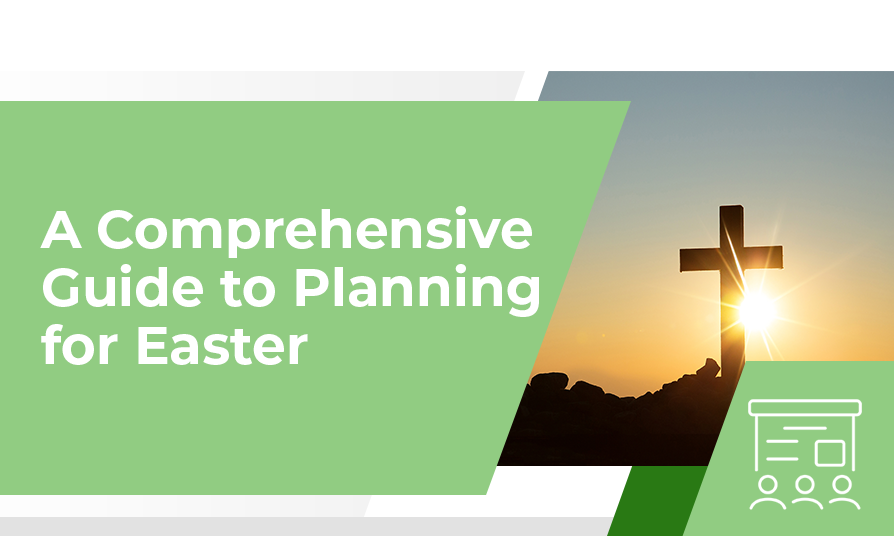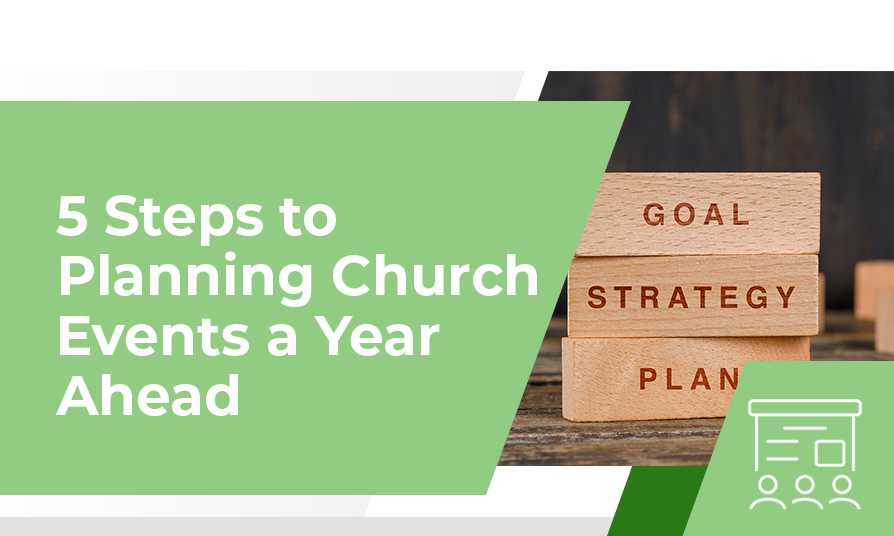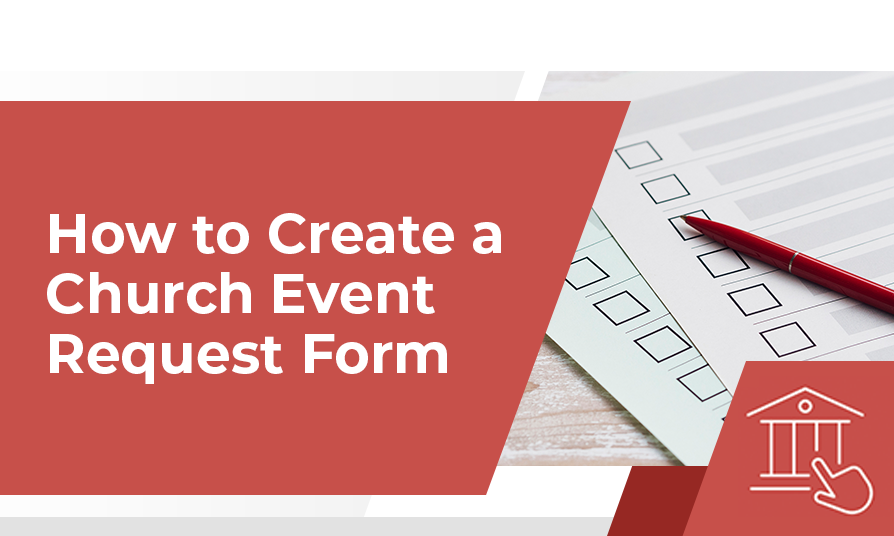Planning an event takes time, teamwork, and lots of organization. Planning for Easter celebrations requires a bit of extra attention. Instead of surfing the web for various tools on how to plan for your Easter weekend, we thought it would be helpful to have one checklist to lead you through the entire planning process. We’ve gathered everything you need to know into one comprehensive guide to help you plan an incredible Easter for your church while also being able to pause and reflect on the season yourself.
#1 — Plan Your Plan
A part of planning for Easter includes creating the planning process. Follow these seven steps to pull off an amazing Easter service.
-
Choose a Leader
First things first, decide who will be in charge of coordinating Easter at your church. Make sure it’s someone who has event planning skills as well as time in their schedule. The Senior Pastor, for example, probably shouldn’t be the one handling Easter logistics, as crafting the sermon and approving the high-level plan is the SP’s focus. Whoever is in charge will need to coordinate between ministry departments — worship, children, youth, service, security, facilities, communications, etc. — to keep everyone on the same page and working toward the same goals. Don’t forget to pull in the accounting, communications, and facilities departments. They tend to get overlooked but they can have a huge impact on the success of Easter services and events. Having one person coordinating tasks is also helpful in preventing several departments from doing repetitive work.
-
Determine the Scope
There are so many things to explore when it comes to planning for Easter celebrations. Once you’ve chosen your leader, get a group together to determine the scope of your church’s capabilities. Will you include outreach events the week before, host an Easter egg hunt, or offer a breakfast gathering before service begins? You may even be thinking of putting on an Easter play. Write this out and talk it over with your department leads before moving on to step three.
-
Finalize a Budget
Creating a budget is such a crucial step to a successful Easter that we dedicated an entire blog post about it. For now, here are a few highlights:
-
- Find out if your church has a budget for Easter. If not, discuss money allocation options with your church accountant or executive pastor.
- From equipment rentals to decor to food, determine what your congregation will need in order to meet your scope.
- Draft your budget, including estimates, and send it to department leads for review.
-
Create a Step-by-Step Plan
Now that we’re counting weeks instead of months until Easter, it’s helpful to assign each task to a specific week to make sure it’s accounted for. Here is a high-level list of tasks by week leading up to Easter:
Week 1:
- Finalize the overall theme and scope of activities for Easter weekend. This includes the sermon title, color scheme, themed décor, communion, food items, etc.
- Gather a planning team.
- Create and finalize a budget.
- Walk through the church campus and make a list of any repairs, clean up, or beautification work needed
Week 2:
- Submit Purchase Requests for supplies, rentals, print jobs, etc.
- Finalize color scheme for Easter graphics.
- Determine if the church will do any outreach events leading up to Easter.
Week 3:
- Order supplies needed for décor, guest handouts/gifts, etc.
- Order rentals (tables, chairs, sound equipment)
- Hire additional security personnel if needed.
- Create graphics for sermon slides, church website, social media posts, handouts, etc.
- Plan outreach events (if applicable).
- Determine volunteer needs (how many you’ll need in each role for Easter weekend).
- Ask for volunteers to help with church repair, clean up, or beautification projects.
Week 4:
- Create social media posts and start scheduling them.
- Create Facebook ads.
- Finalize worship set list.
- Schedule worship team rehearsals.
- Ask current volunteers to serve during Easter weekend.
Week 5:
- Recruit additional volunteers as needed (contact people who have served at events but not on a regular basis).
- Prepare volunteer instructions and training materials.
- Purchase supplies needed for Easter Sunday.
- Promote Easter services via Facebook ads, social media posts, and mass email to the congregation.
- Decide how to follow up with Easter guests and set that system in place. You may need additional volunteers to help with data entry or other follow-up needs.
Week 6:
- Complete church repair, clean up, or beautification projects.
- Finalize sermon slides.
- Send any final print jobs to the printer.
- Encourage the congregation to invite others to Easter services.
Week 7:
- Double check that all supplies needed for Easter Sunday were purchased.
- Conduct a service run-through.
- Conduct worship team rehearsal.
- Host outreach event if applicable.
- Put guest follow-up process into place.
-
Put the Plan into Place
Now that you have your weekly plan, assign tasks to the appropriate team member, making sure to emphasize the deadlines for each. It’s also a good idea to send email reminders to your team in the days and weeks before their task is set to be complete. When volunteers are likely dealing with a number of obligations outside of church, this is a great way to keep your church activities relevant and on track.
-
Enjoy an Impactful Easter!
If you have followed this list until now, you are ready to reap the fruits of your labor. Now, enjoy an impactful Easter!
-
Review and Reflect
Hosting a successful Easter celebration for years to come is only possible with a review of what worked and, most importantly, what didn’t. Sit down with your planning team and members of your congregation to determine what didn’t go quite as smoothly as you’d hoped. Learn from these lessons and plan better for next year.
#2 — Recruit Volunteers
Without a doubt, you’re going to need extra hands for Easter. By putting these tips into practice, you can start filling those volunteer roles now while adding to your regular volunteer team later. For a full discussion on working with volunteers in your church, take a look at my book, The Volunteer Management Toolkit (Church Edition).
-
Tip 1: Determine What Roles You Need
Make a list of the volunteer roles you’ll need to fill along with a description of what each role involves. Example: Photo Booth Coordinator — Volunteers in this role will keep the line organized, help families get their pictures taken, and keep any décor in the photo booth clean and in the proper place. Here are a few other roles to consider:
- Parking lot attendants
- Greeters
- Ushers
- Childcare providers
- Hosts – Helping guests find the nursery, sanctuary, handing out coffee and donuts, etc.
- Campus cleanup team for before, during, and after Easter services
- Bookstore attendant
- Coffee maker
- Communion preparer
-
Tip 2: Define the Schedule
Before you ask volunteers to serve, you need to know what serving that day will entail.
- Will you have volunteers come in earlier than usual? If so, what time do they need to arrive? Is their arrival time based on their role or should all volunteers come at the same time?
- Do you need volunteers to handle anything during service (such as setting up Communion elements or assisting with baptisms)?
Create a minute-by-minute service order that details what Easter Sunday will look like before you contact potential volunteers. They may have questions that this information will help you answer.
-
Tip 3: Identify Volunteer Leaders
You probably have volunteers who lead other volunteers on your behalf. You will likely have a lot to do yourself Easter weekend, so you want to make sure your key leaders can serve that day. You also need to provide them with information and instructions on what you need them to do. The better you equip them beforehand, the more effective they will be in preventing issues and keeping things running smoothly. Once you have people sign up to serve who aren’t part of your regular volunteer team, let the appropriate volunteer leader know. Your volunteer leaders need to train these new volunteers and make sure they have a great experience serving.
-
Tip 4: Invite People to Serve ASAP
Once you know what Easter weekend will look like, what roles you’ll need to fill and that your key volunteer leaders are on board, start inviting others to serve. Talk with your regular volunteers on Sunday mornings, send out follow-up emails, ask current volunteers to help you find more people to help, etc. The sooner you start getting this on their schedules, the greater the likelihood that you’ll have all those volunteer spots filled way before Easter weekend.
-
Tip 5: Send Reminder Emails the Week Before Easter
The only danger in asking people to sign up to serve well in advance is that they might forget about their commitment. Send out reminder emails the week before Easter to remind them of the volunteer role they’ll fill that day, what time you need them to arrive, and where they should meet when they get to the church.
-
Tip 6: Feed Your Volunteers
Provide coffee and a few snacks for volunteers. If you have a room they can meet in for final instruction, set up a small table with goodies for them. This is especially important if you have volunteers helping with multiple worship services. They’ll appreciate your kindness, and you’ll keep them fueled for the morning.
-
Tip 7: Send Thank-You Notes
You’ll probably need volunteers to go above and beyond for Easter services. Acknowledge their contribution to making those services run smoothly with a short, handwritten thank-you note. We’re so used to receiving electronic messages that a card in the mail will really stand out.
-
Tip 8: Follow Up with New Volunteers
The week after Easter, contact those who served on Easter Sunday who aren’t on a regular volunteer team. Another option is to ask your volunteer leaders to contact these individuals. That may work better since your volunteer leaders probably interacted with them more than you did. Ask what they thought of their experience serving and see if they’re interested in becoming part of the team. Don’t assume they’ll sign up without you inviting them. They may not realize you need more volunteers on a regular basis. It’s worth taking a few minutes to get their feedback and ask if they’d like to serve more often.
#3 — Honor Your Volunteers
Continuing with Tip 6 (above), it’s so important to make your volunteers feel appreciated. Provide donuts and coffee, take water to the parking lot team, and say “thank you” a lot on Easter Sunday. You’ve probably asked volunteers to cover multiple services or help setup activities in the weeks leading up to Easter. Remind them why what they do is important and how each role contributes to creating an excellent environment for people to hear the Gospel.
#4 — Invite the Community
Make sure your community knows about Easter services and that you’d love to have them join you. One way to expand your reach is to get your local community involved. Here are a few ways to invite non-members:
-
Host an Outreach Event
Consider hosting an outreach event the week leading up to Easter. This gives your congregation a chance to serve the community and helps spread the word about Easter services. Need some ideas?
- Coordinate with local schools to beautify classrooms, playgrounds, and other common areas.
- Host a clothing, food, or school supplies donation drive. Find out what areas of your community need assistance and what would be most helpful to them this time of year.
- Talk with employers in the area and see if hosting a job fair would be beneficial. Let employers set up booths at the church and invite job seekers to come and apply for jobs. Consider providing resume assistance, interview preparation, and professional clothing for job seekers as well.
-
Targeted Emails
- Send an email to those in your church database who haven’t attended in a while. If you don’t keep attendance information, send a mass email to everyone in the database inviting them to Easter services and encouraging them to invite others.
- Email regular church attendees asking them to invite others.
-
Use Business Marketing Tools
While a church certainly isn’t a business, there are tools the corporate world uses that we can leverage to share the Gospel. Aside from word of mouth, there are various methods to getting more visitors in your doors this Easter. Consider some of the following marketing tools:
- Social media ads
- Billboards
- Radio ads
- Flyers
#5 — Guest Follow-Up
What’s better than a full sanctuary on Easter Sunday? A full sanctuary every other Sunday of the year. Bring your Easter guests back for more with this solid follow-up plan:
-
Decide How to Gather Information
You were able to get them there, now you want to keep them there. First, you’ll need to figure out a system on how to gather contact information from your Easter guests. Here are a few suggestions on how to do that:
- Connect cards that they fill out and hand in during the offering or after Easter service
- Create a mobile app (an electronic connect card) specifically for your church
- Use a text service to have guests text a designated number to fill out an online connect card
-
Decide What Information to Gather
It’s best to keep this step as simple as possible. Instead of asking for their life history, stick to the basics. Whether paper or electronic, your request forms should include:
- Name
- Email address
- Phone number
-
Record Information in Your Church Database
Next, you’ll need to get this contact information recorded into your church ChMS or other database. If you used paper forms to collect this information, we recommend you get a few volunteers to come in the Monday after Easter to enter the data. The sooner this happens, the better — as you will want to reach out to your guests before the following Sunday service.
-
Create the Follow-up Procedure
You have their info, now what? Here are a few options:
- Send a mass email to all Easter guests inviting them to come back the following Sunday. This is also a good opportunity to highlight special events you have coming up or how they can get into a discipleship program.
- Send a mass text message inviting them to come on Sunday for a new series entitled, “<insert title here>”.
- Did they provide a phone number but prefer no text messages? Invite these guests with a phone call, mentioning that this is a great time to get to know the church leaders, ask questions about faith, and learn more about the church.
-
Pray for Your Guests
The final step is the most important one. Pray for your guests. Pray that they have a desire to come back to your church. Pray that God will put in their hearts a calling for worship. Pray that you will be given the opportunity to water the seeds that were planted on Easter Sunday.
#6 — Special Considerations
With all the Easter prep underway, it’s easy to forget the small things. Here are a few items you may want to consider as you put the finishing touches on your Easter plans:
-
Insurance Coverage
If you’re planning a helicopter Easter Egg Drop or any other special event, contact your church’s insurance agent to find out if your current coverage is sufficient. You might need to purchase coverage specific to that activity.
-
Live Animals
If you want to have real bunnies on hand in addition to (or in lieu of) someone dressed up as the Easter Bunny, here’s a tip that will help you avoid issues with parents and children afterward: Borrow bunnies from someone who will watch over them at church and who will also take them home. You don’t want parents mad at the church because their child “won” a bunny at church and now they have to figure out how to take care of it.
-
Preparing Food
If you decide to host an Easter brunch and prepare food at the church, find out if you need those involved in food preparation to have food handler permits. If so, you’ll want to start looking for volunteers now who already have those permits or schedule people to get them ASAP.
#7 — Lessons Learned
Before you rush off to start planning your next event, come together as a team to reflect on how Easter went and take those lessons forward. Were there any hiccups or issues that came up? Aspects of the weekend or events leading up to Easter that went really well? Here are a few questions to ask yourself post Easter so you can start planning for a better one next year.
-
What Went Well?
Did you try something new this year? Make a list of everything that went smoothly over Easter weekend and trace each item back to why you think that element was a success. Next, decide what you can learn from those successes and apply that information to other events or even weekly services.
-
What Didn’t Go Well?
Volunteers weren’t as organized as you’d hoped. The guest gifts didn’t arrive on time. Your photo booth didn’t get much traffic. The sound system went haywire. Things go awry sometimes. Your team probably rolled with the punches and overcame whatever obstacle fell in their path, but it would be nice to avoid that situation in the future. Make a list of what went wrong and what you see as the cause of each issue. This isn’t about placing blame (although you might need to talk with someone if they totally dropped the ball). The point of this exercise is to learn from what went wrong so you can prevent similar issues going forward.
-
What Are People Talking About?
What elements of the service or overall experience are people talking about a week later? Have you noticed any comments on your church’s social media accounts? Have you received any emails or phone calls about Easter weekend? Have you had an influx of people signing up for baptisms, small groups, or to volunteer? What is the church staff team reflecting on a week later? Is it a moment in the service that was especially moving or perhaps it involves something special you did for guests? Whatever people are still talking about a week after Easter — that’s something to reflect on. Why was that moment so memorable? What can we do to build on that momentum or provide an environment where that can happen more often?
-
What Did Volunteers Experience?
Talk with two distinct groups of volunteers about Easter weekend — those who served that weekend who are on a regular Sunday volunteer team and those who served Easter weekend but aren’t on a Sunday team. Ask them what they think went well and what didn’t. Did they see or hear anything from the congregation that would help your team prepare differently next year? Also, find out which questions your volunteers received most often from guests. These volunteers were on the frontlines and are a great source of information.
There’s a lot to do to prepare for Easter, but none of it compares to the work Jesus did on the cross. In other words, He did the hard part (to put it mildly). Your job is to plant seeds and water them. Do your Easter planning with excellence, as unto the Lord, and trust Him with the results. Hopefully, that helps keep your large to-do list into perspective.
We also want to encourage you to not just focus on celebrations with your church, but also with your family. If your church does an Easter Egg Hunt, get out there with your kids and enjoy that moment with them. If at all possible, sit with your family in the service or make time later in the day to reflect as a family.
Above all else, remember this one thing:
The message of the cross is simple enough for a small child to understand and still powerful enough for a skeptical adult to be convinced.
Go forth and convince. Present the Gospel, plant the seeds, and continue to water them in your community. I’m praying you have an incredible week celebrating the resurrection of our Savior.



